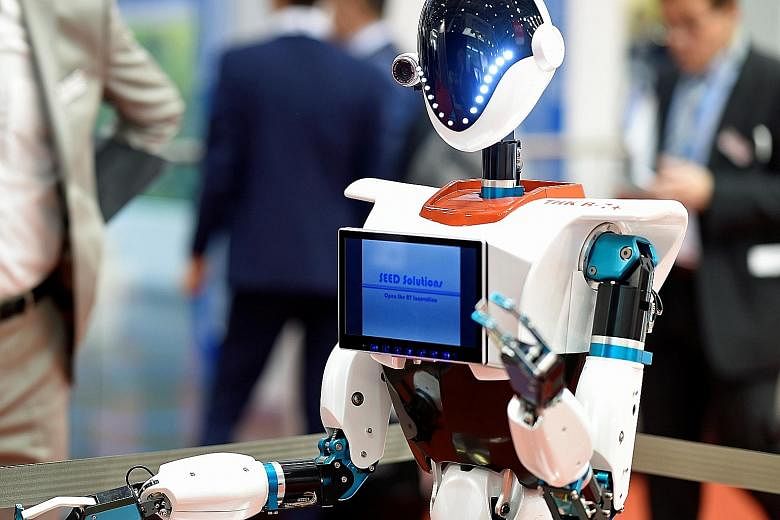LONDON • Machines or software may eventually replace a third of graduate-level jobs worldwide, with legal frameworks for regulating employment and safety becoming rapidly outdated, says a new report by the International Bar Association (IBA), a global forum for the legal profession set up in 1947.
The innovation in artificial intelligence (AI) and robotics could force governments to order quotas of human workers, upend traditional working practices and pose new dilemmas for insuring driverless cars, says the report, released this week.
The IBA's survey found that the previous manufacturing model of poorer, emerging economies having a competitive advantage due to cheaper workforces will soon be eroded by robot production lines and intelligent computer systems.
To illustrate, a German car worker costs more than £40 (S$70) an hour, but a robot costs only between £5 and £8 an hour.
"A production robot is thus cheaper than a worker in China," the report notes.
-
5 categories of AI economics
-
In its report, the International Bar Association said the economic use of artificial intelligence (AI) could be separated into five categories.
DEEP LEARNING
This is machine learning based on a set of algorithms. Unlike human workers, the machines are connected the whole time.
If one machine makes a mistake, all autonomous systems will keep this in mind and will avoid the same mistake the next time.
In the long run, intelligent machines will win against every human expert.
ROBOTISATION
Since the 19th century, production robots have been replacing employees.
They work more precisely than humans and cost less. Creative solutions such as 3D printers and the self-learning ability of these production robots will replace human workers.
DEMATERIALISATION
Due to automatic data recording and data processing, "back office" activities are no longer in demand.
Autonomous software will collect information and send it to the employee who needs it.
CDs and DVDs are being replaced by streaming services, with event and travel tickets next, due to the possibility of contactless payment by smartphone.
GIG ECONOMY
A rise in self-employment is typical for the new generation of employees. The gig economy is usually understood to include chiefly two forms of work: "crowd working" and "work on-demand via apps" organised networking platforms.
There are increasingly more independent contractors for individual tasks that companies advertise on online platforms.
Traditional employment relationships are becoming less common.
AUTONOMOUS DRIVING
Vehicles have the power for self-governance using sensors and navigating without human input. Taxi and truck drivers will become obsolete.
The same applies to stock managers and postal carriers if delivery drones are used.
A big advantage of the machines is that they do not "become ill, have children or go on strike, and are not entitled to annual leave".
The 120-page report, which focuses on the legal implications of rapid technological change, was produced by a specialist team of employment lawyers.
The report also takes a peek at the future consequences of what it terms Industrial Revolution 4.0.
The three preceding revolutions are listed as industrialisation, electrification and digitalisation.
Industry 4.0 is described by the report as the integration of the physical product and software in production and the service sector.
The 4.0 pioneers are Amazon, Uber, Facebook, "smart factories" and 3D printing.
"What is new about the present revolution is the alacrity with which change is occurring, and the broadness of impact being brought about by AI and robotics," says the report's lead author Gerlind Wisskirchen.
He is an employment lawyer in Cologne and vice-chairman of the IBA's global employment institute.
"Jobs at all levels in society now undertaken by humans are at risk of being reassigned to robots or AI, and the legislation once in place to protect the rights of human workers may be no longer fit for purpose, in some cases...
"New labour and employment legislation is urgently needed to keep pace with increased automation," Mr Wisskirchen writes.
Governments will have to decide in the future what jobs should be performed only by humans, such as caring for babies.
"The state could introduce a kind of 'human quota' in any sector," and decide "whether it intends to introduce a 'made by humans' label or tax the use of machines", according to the report.
Another issue the study examined was whether there should be limits to a machine's autonomy.
"A no-go area in the science of AI is research into intelligent weapon systems that open fire without a human decision having been made," the report says.
"The consequences of malfunctions of such machines are immense, so it is all the more desirable that not only the United States but also the United Nations discusses a ban on autonomous weapon systems," it adds.

